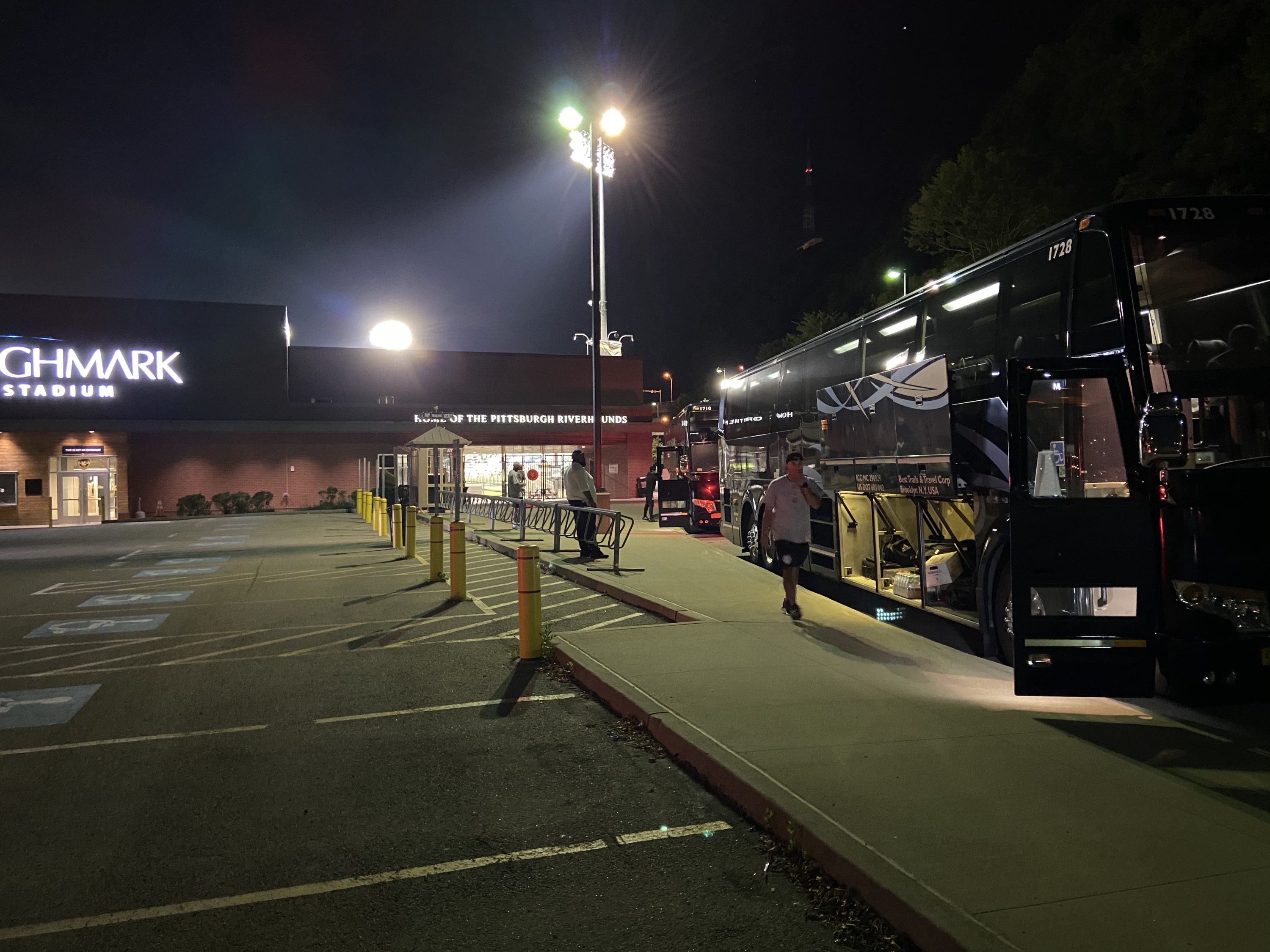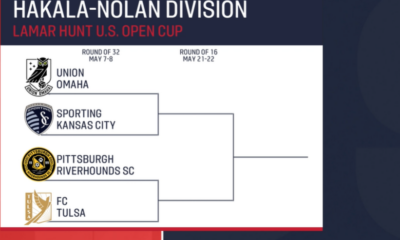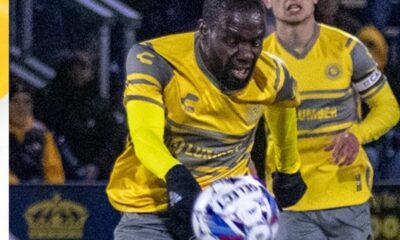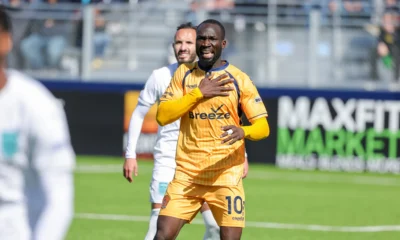
Skylar Thomas leans his lanky 6 foot 3 frame into his seat on his coach bus and starts to settle in for the long ride. He’s got Florida rapper Rod Wave’s latest album loaded up on his smartphone. Drawing back the shades and cinching up his mask, he dozes off to sleep. When he awakes, the album’s over, so he pulls up a business podcast that he likes and looks out the window – gazing at the blur of trees out the window as they go by. Thomas reaches into his backpack and lowers his mask to eat a sack lunch he packed himself. After an hour-long discussion of marketing strategy, the podcast is over, but the turnpike stretches on. There’s still 3 more hours to go until Harrison, New Jersey.
Several rows away sits second-year midfielder Robbie Mertz, who has taken up his spot in a pre-assigned and pre-marked seat on the bus. Everyone is masked and spaced and socially distant, making it hard to have a conversation. The most important thing for a USL season such as this is a really good set of headphones, and either a great list of recommended podcasts or a natural talent for falling asleep on a moving vehicle.
This is a taste of the life in pandemic-season USL: long bus rides, sack lunches, no wifi, and a lot of boredom.
…
The 2020 soccer season for members of the Pittsburgh Riverhounds is like a life distilled into a much simpler set of outcomes: soccer, and the dull wait in between soccer.
When they aren’t on the playing pitch, players are generally sequestered under quarantine with their roommates. There’s no going out to see friends, or to a restaurant. There’s no mass gatherings with teammates, even though many of the Hounds live in the same team sponsored apartment complex.
For Skylar Thomas, that means he spends a lot of time with his roommate, defender Thomas Vancaeyezeele. “Tommy is my roommate, so we usually drive together to training, too.” The team’s policy is to have apartment roommates serve as hotel roommates too. I joke that Skylar must be sick of all this time with Tommy. Skylar chuckles and replies, “Nah, I like it.”
It’s a different story for Mertz. “I live at home here in Pittsburgh, so I do not have a roommate on the road. I’m spending like 10 hours before the game by myself. It’s not the most exciting thing.” Mertz passes the time by calling his girlfriend, watching Premier League games, and reading.
Robbie’s a big reader – he plowed through a pile of books during the full-on three-month lockdown, and continues consuming reading material now that the season is back on again. Right now he’s reading Bryan Stevenson’s ‘Just Mercy’, the true story of a defense attorney and his client as they try and navigate through some of the worst aspects of the broken American criminal justice system. Skylar makes the best of hotel room time too. He’ll consider business and marketing strategies or make tweaks to the website of the business venture he’s started – Kick Deck.
“It’s a personal soccer trainer and a deck of cards. It has 52 soccer drills that a kid could take, shuffle up, and start training with.” Skylar might also jump on a video call to his family back home in Canada. He chats with them regularly, although this year’s Covid limitations have a greater impact on him than Robbie. Because travel between the United States and Canada is forbidden, this will be the first season that his relatives will not have the opportunity to see Thomas play in person. For Robbie’s family, watching their son play is just a drive from the South Hills to Highmark on gameday. For Skylar’s family, it’s strictly ESPN+.
Still, there are things to look forward to on the road. Thomas really enjoys the amenities of being a traveling athlete. “I’m a huge fan of hotel beds. The room’s made up so nicely, and the temperature’s perfect.”
Comfy beds aside, the limitations of Covid away-game travel are mostly a drag for the players. Mertz tells me, “Those trips are where your team bonds. I have some great memories from last year. But that’s not really the case this year.” Those limitations are understandable though – a positive Covid test, and perhaps a game (or two or three) will be suspended, putting the season in doubt. It forces the players to be disciplined and regimented not only on the field, but off, in order to be successful.
Mertz is mature beyond his 23 years with his reflections on the matter: “All the protocols in place, that’s all well and good, but the important thing is what people are doing off the field, away from the team. If someone brings something in – we could be doing everything the league wants us to be doing at the stadium to a T and it might not matter because of what happened off the field. I think we all recognize that. We players are a low risk. But at the same time we have a duty to some of the people around us to be disciplined.”
Many sports teams during the pandemic have not been as disciplined. And it has cost them.
The Miami Marlins had to suspend MLB play for 9 days earlier this month when 18 players tested positive for Covid-19. FC Dallas and Nashville SC arrived at the MLS is Back tournament in Orlando Florida, only to go home before playing a single game because 10 players for Dallas and 9 for Nashville tested positive. The Orlando Pride have possibly the most embarrassing incident to be publicly revealed regarding a “lack of discipline” – 10 players and staff tested positive for Covid not long after “multiple players visited a bar”, according to reporting from Meg Linehan at The Athletic.
The USL has not been immune to the challenge of keeping their players uninfected. Several teams, including Las Vegas Lights, LA Galaxy II, and Philadelphia Union II have all postponed matches due to positive Coronavirus results.
This is now the third Philly match that is postponed. https://t.co/48GNcb2HnW
— Steel Army (@SteelArmy) August 23, 2020
The Union have missed the last three games, and reschedulings have yet to be announced.
In order to avoid that, the Riverhounds are something akin to soccer-playing monks: they go to training, they come home, they eat, they sleep. Rinse. Repeat. They get tested two to three times a week – a nasal swab they administer themselves, which Thomas describes as “uncomfortable” but also “not that bad.” The testing is a key component to the health and safety of the team, but their individual and collective behavior is probably more important. Limiting their potential exposure to the virus is critical to the success of the season – but it is also a directive handed down on high from the league. Thomas tells me that the USL quarantine rules “definitely looks different from the average population.” “We can go to the supermarket. I can go get a haircut. If I need to ship something, I can go to the post office. But that’s it.”
…
As long as everybody is healthy, and after they withstand the long bus ride and the sequestration in rooms and apartments, gameday still has many of the aspects of pre-Covid gameday. But with some twists.
On the road as well as at home, the team does a morning meeting Zoom call with everyone in their rooms. And for away games, there is one final team meal together before the match. After that, players return to their hotel rooms to dress before piling into the bus. They are required to arrive and unload at the stadium relatively close to kickoff time. Thomas says, “We arrive much later than we usually would. It’s pretty much 15 minutes in the locker room before we warm up on the field. Coach’ll talk, we go out there and warm up, come back in, coach’ll talk, and then we go ahead and start the game.”
In fact, the only time things are really, really the same for the players as in any other year is the 90 minutes between the lines.
Despite everything that’s going on, the players have spent their lives cultivating the ability to give it their all when the whistle blows. Mertz tells me nothing this season has shaken that; “In any other season people have things going on in their lives. But when it comes to playing soccer, a lot of things take over that’s automatic. Once the whistle blows – I don’t think people look outside the lines. I’m not standing there on a corner kick thinking ‘Oh, does this guy have Covid?’ At the end of the day I would try to score a goal anyway.”
Everything else is different. The game is the same.
…
Muscles tired, still sticky with sweat, head still fuzzy from the slow recovery of glucose and hydration after ninety minutes of doing battle, the players board the bus. In any other year, they could look forward to a return to the hotel and a nice shower, and then maybe dinner at a Manhattan pizza place; a real Phillie cheesesteak; some infamous Beale Street barbeque. And then perhaps a pint with the fellas to recount goals scored and tackles missed. In any other year. Not this season.
“A lot of times when we’re on the road, the time to see the place is after the game. We’ll go out, get something to eat, see the town a little bit. That’s gone now.”
Sampling local culture and taking in the sights was nice, but it’s the after-game hang time with his fellow Hounds that Mertz misses the most.
“That’s the biggest thing that I’m missing – using those times to bond with my teammates a little more.”
This year there is no rest for the weary: ninety minutes of football concludes with a quick change, packing up the locker room, and getting on the bus for the six hour drive back to Pittsburgh.
“As soon as the game is over, we’re hitting the road and getting back at 4 or 5 am.”
…
The Riverhounds will pull into the parking lot at Highmark Stadium just before dawn on Saturday morning, returning from a Friday night game in Hartford after a seven and a half hour bus ride. They will emerge from the fitful sleep of upright slumber on a moving vehicle, with all the groggy exhaustion that normally entails, plus the bumps and bruises of another night of gladiatorial USL combat. They will climb back into their cars and carpool back to the team apartment complex, and properly sleep.
Hopefully they’ll find rest and rejuvenation. They’ve got another match on Tuesday; and at the end of the week, there is, yet again, another long bus ride to New York.















